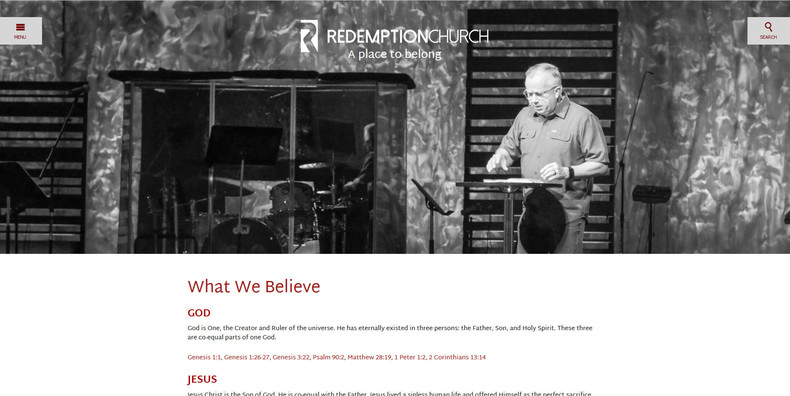The messengers to the 2021 Southern Baptist Convention just elected a new president, Dr. Ed Litton, who has pastored Redemption Church in the Mobile, AL, area since 1994. I keep tabs on things brewing the SBC but have never heard of Litton or the church where he serves, so I looked them up online. At first blush, there's nothing surprising about their website or the church, it appears to be a rather stereotypical Evangelical contemporary church--worship band, check; music stand 'pulpit,' check; pastor wearing jeans and untucked shirt, check; and so on. Blah, blah, blah.
I went to the "What We Believe" section of their website expecting a copy and paste of the Baptist Faith and Message...but that's by no means what greets the visitor there. The very first article of faith presents a deficient and heretical view of the Trinity.

Can you spot it? I'll give you a hint, the heresy is Partialism. This false view teaches that Father, Son, and Holy Spirit are components, parts, or aspects of the one God. In the words of Redemption Church, "These three are co-equal parts of one God." Here is bad example of the Trinity as a shamrock put into practice. Nope. Sorry. Wrong. God is not the Wonder Twins (or Triplets) that must all come together to be fully and completely God. This view affects our worship, our prayers, and our daily life insofar as orthodox believers trust in and draw on the grace and strength of each person of the Trinity as fully God and fully able to hear, lead, protect, guide, answer, and preserve us.
Returning to the Athanasian Creed, we are properly taught, "We worship one God in Trinity, and Trinity in Unity; neither confounding the Persons, nor dividing the Essence." Partialism divides the essence of God into three parts, something the Church has been teaching against for about 1500 years.
Theology is important. History is important. Creeds are important. Now I have no reason to think that Dr. Litton or those responsible for the confession of faith at Redemption Church are truly heretics. I'll give them the benefit of the doubt and suggest this is simply what happens when we're casual, careless, and ahistorical in our work of theology. That said, deficient views affect more than the dusty tomes of theologians. They have real-life impacts on how we live, work, and worship.
